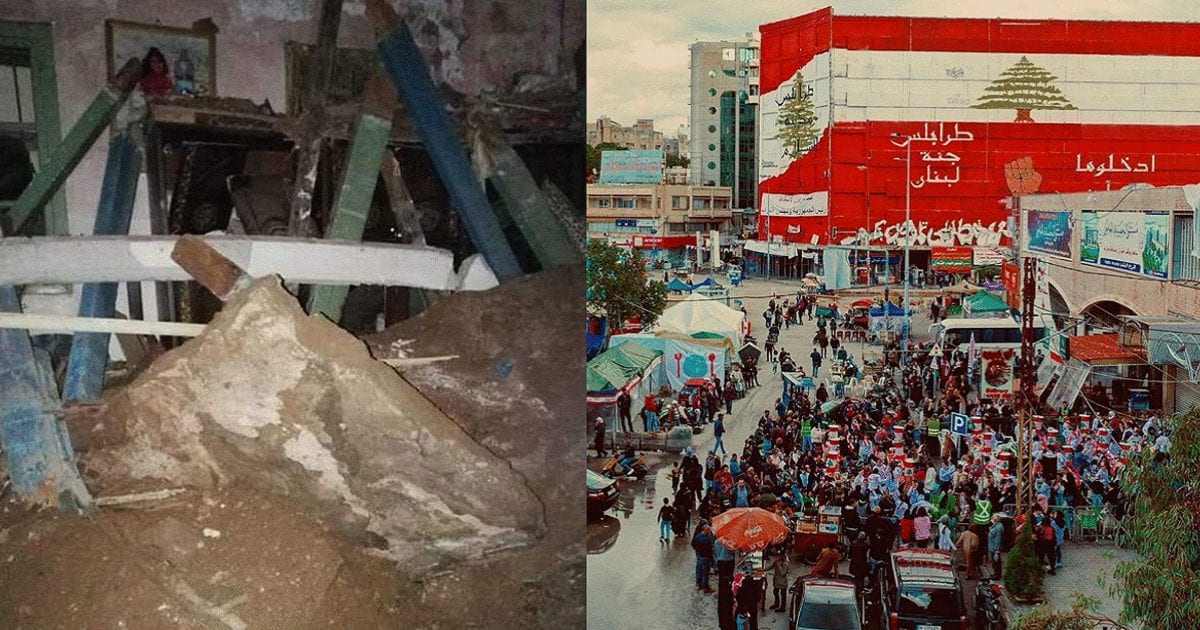On Tuesday, December 10, people in Lebanon woke up to horrible news. Abdul Rahman and his sister Rama Kakhyeh were victims of the poor construction of their home in the district of Mina in Tripoli, North Lebanon. The ceiling of their home collapsed under the storm and the heavy rain that has flooded Lebanon these days, killing both siblings.
This horrific incident started wildfires in the hearts of the victims’ neighbors and friends. Adul Rahman was preparing for his engagement on the weekend of the same week, while his sister Rama’s hanged picture was the only thing left undestroyed in the house.
From what the people in the area described, we understand that the siblings had high hopes in the revolution and believed that it will result in a better future for Lebanon.
The residents of Mina knew who to blame as a number of them accused the municipality of neglect, noting that the victims had appealed to it many times to restore the house, but there was never a response.
This neglect is what led to the house to collapse on the sleeping siblings at around 2:30 in the morning. The people of Mina and the Lebanese civil defense spent all night looking through the ruins for the bodies.
After the funeral of the siblings, a number of grieving and angry citizens went to protest in front of the Mina municipal building. The Lebanese army formed a human shield to deny them from going into the building. The protesters reacted by throwing chairs, stones, and trash cans at the building, leaving it utterly damaged.
The Mina protesters also destroyed some of the municipality’s vehicles, turning them upside down. The army finally managed to recede the crowds and control the situation, or at least they thought so. In the evening, the protesters came back to block both sides of the Mina roundabout with burning tires.
A big case of tension and conflict happened between those who wanted to block the roads and the army who was trying to stop them. Many fell wounded on both sides before the army retreated and the blocking was achieved.
When asked about the sudden change in the behavior and the path of the revolutionaries in Tripoli that went from peaceful to aggressive, one answered: “Hunger, poverty, and death aren’t peaceful, and we are hungry, poor and slowly dying.”
All of this happened despite the resignation of various members of the Mina municipality that followed the tragedy, and their stand with the people and their support to the demand of the mayor’s resignation.
At the protests ending in front of the municipality, these municipal members made the following statement: “After the tragic accident that led to the martyrdom of the young man and woman, son and daughter of Mina, Tripoli, we place our resignations in the hands of our people in Mina.”
The statement revealed that they had filed several lawsuits against the Mayor of Mina for corruption and neglect in his work, cases that were “covered several times.” The statement continued with: “We now ask the mayor, Abdel Kader Alam Eddine, for his immediate resignation from the municipality.”
The resigned municipal members concluded by asking the mayor to leave this position open for one of the municipal members to take over in order to prevent the void and to prevent the governor of the north to put his hands on it, which would be unacceptable by the people “because he is a rejected character from the people of Mina, the people of Tripoli, and the Revolution alike.”
The resigned members are Hashem el Ayoubi, Rami el Sayegh, Amer Faydalah, Mayez Mubayad, Mark Kubrsiyeh. and Atef Tabboush. The roundabout in Mina, Tripoli remained blocked and was followed by supportive movements in Beirut and Bekaa.
Our deepest condolences go to the victims’ friends and families, and may the pain in the people’s hearts in Tripoli eases. We hope that the coming days will bring the pacific revolution back and suitable solutions for the people and the country.






















